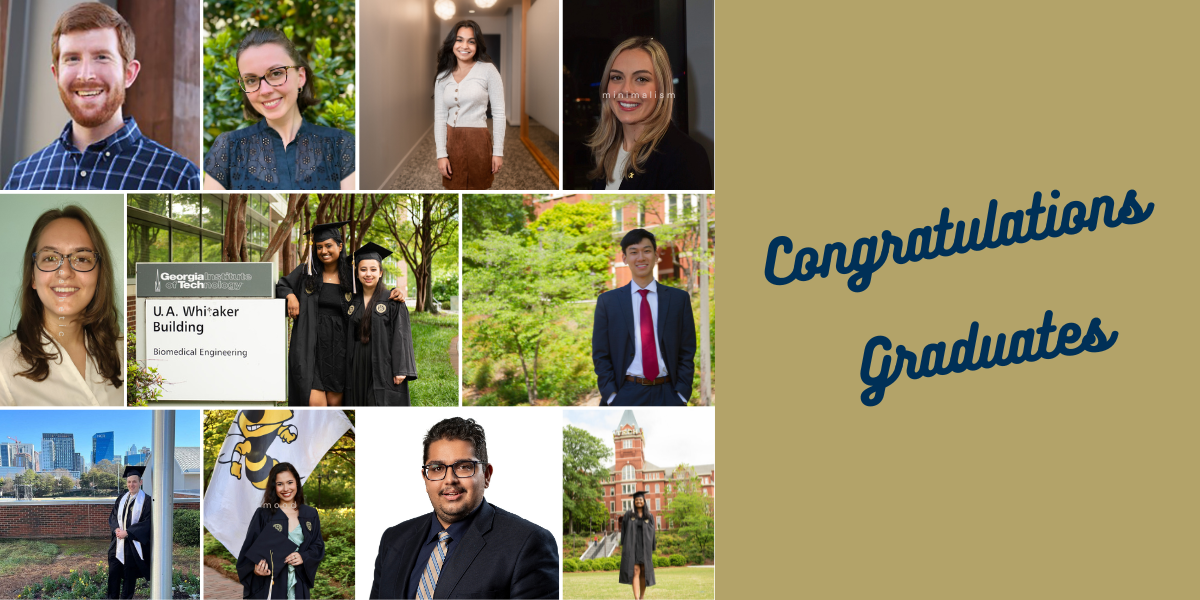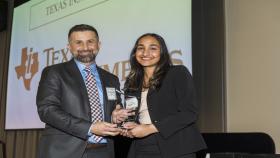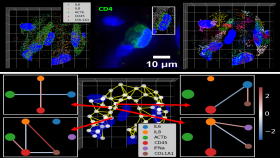From starting jobs in the biomedical engineering industry to heading to graduate school, Coulter BME spring 2023 graduating students are moving to new heights.
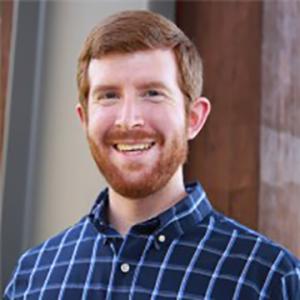
Charles Anthony Ellis
Charles Anthony Ellis
Doctor of Philosophy in Biomedical Engineering, Machine Learning concentration
Building a start-up company while obtaining a Ph.D. is a tremendous task and Charles Anthony Ellis knows all too well the work it takes to achieve both. Ellis, co-founder of TotemID Biosciences and Coulter BME’s Outstanding Entrepreneurship/Translational Research Award winner, is graduating this spring with his Doctor of Philosophy in biomedical engineering with a concentration in Machine Learning.
“My co-founders and I have put a lot of time and effort into our startup over the past several years, and balancing a startup with a PhD has been enormously challenging at times,” Ellis said. “We could not have accomplished everything that we accomplished without the support of our PhD advisors, our departments, and the many other Georgia Tech staff members that provided us with much needed advice over the years.”
Early on in his Ph.D., Ellis found an interest in entrepreneurship. He soaked up all he could about starting a company through books, going to networking events, and talking to anyone he could. He also visited the Create-X: Startup Launch demo day to see the work of other budding entrepreneurs. The next day, he ran into his co-worker’s girlfriend who was interested in launching a startup and had heard from Ellis’s co-worker that he would be a good fit as a co-founder.
“We ended up working on one side project for a few months before eventually participating in Startup Launch with another venture,” he recalled.
Ellis has a number of plans for his post-doc career. He begins his postdoctoral research position in June in to support his Ph.D. lab’s efforts to commercialize technology that uses machine learning to assist clinicians with the diagnosis of depression and bipolar disorder. Concurrently, he will continue work with his startup’s co-founders to sell their intellectual property. After his postdoc, Ellis would like to move into an industry position related to product development in AI for healthcare.
For all the work and time commitment needed to complete an advanced degree and run a startup, Ellis still managed to find time for fun and building connections outside of the classroom and labs. From being involved in his local church to taking martial arts classes at Georgia Tech’s Campus Recreation Center, those extracurricular activities allowed him to grow as a person and be a great mentor to his undergraduate assistants.
“Don’t forget that your professional life consists of more than just coursework and research, and don’t forget that your life consists of more than your professional life,” he said. “Some of the best professional growth experiences (e.g., starting an on-campus organization and a company, participating in leadership training programs) that I have had during my PhD came from outside of normal academic endeavors, so don’t be afraid to branch out and experiment some.”
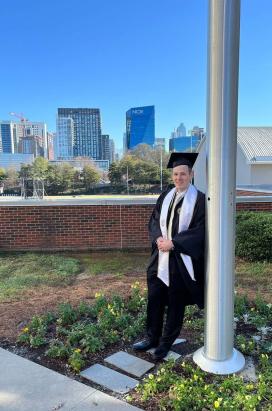
Peter Lais
Peter Lais
Bachelor of Science in Biomedical Engineering, Pre-health concentration
The Hive Makerspace is where many an engineering student spends sleepless nights crafting the prototypes for the next innovative tool or device to solve a problem. For Peter Lais, he fondly remembers the Hive as a place where he made new discoveries and new friends.
“There were too many times to count when I put on some headphones, played some classical music, and got to work on turning some ideas into prototypes,” he remembered. “Often when operating the 3D printers or PCB fabrication machines, I would spot some fellow PIs—who themselves came from all kinds of majors at Tech—sit down, and talk for ages about the past, present, and future.”
Lais will take the stage on Saturday, May 6, as one of many biomedical engineering undergraduates to earn his degree from Georgia Tech. He also was awarded the Coulter BME departmental academic excellence award.
“The academic excellence award is the culmination of 3.5 years of hard work and late nights, but it is also a team effort,” Lais said. “This wouldn't have been possible without the support of my family, friends, and faculty who provided me with emotional support and guidance throughout my journey as a Yellow Jacket.”
As a pre-health student some Lais’s best memories are bonding with friends and getting know peers from other disciplines through extraccuriculars. Being a member of GT Medical Robotics club offered him an opportunity to meet people with common interests, which he encourages other students to do.
“And don't forget to explore Atlanta and find some fun things to do,” he explained. “College seems long, but it's also short; there are so many things that you can do to have fun at Tech that you can't quite replicate anywhere else. Form good memories now, since these are the ones that will last forever!”
This Fall, Lais plans to begin an MD-PhD program, but before that starts, he will spend the summer work at an ophthalmology clinic to get a sense of how patients interact with healthcare professionals in a clinical setting. He also hopes to hands-on research into reproductive biology and genomics at the NIH to gain a greater familiarity with dry- and wet-lab research.
“If everything goes smoothly, I should enter Fall 2024 with an ample background in medicine, dry-lab research, and wet-lab research to effectively kick off my journey toward becoming a physician-scientist,” he said.
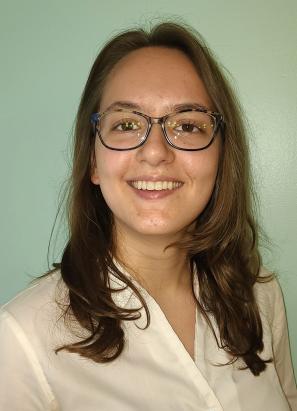
Sofiya Vyshnya
Sofiya Vyshnya
Bachelor of Science in Biomedical Engineering
One of the most valuable parts of anyone’s education is getting know professor’s and garnering their support for one’s academic goals. Sofia Vyshnya made that a priority from the moment she stepped onto Georgia Tech’s campus. Now a senior graduating with her bachelor’s degree in biomedical engineering, Vyshnya ca say those relationships have really paid off.
“I wanted to get involved with research in my first year of college,” she remembered. “I heard that labs may prefer older students with more experience (and honestly, compared to other students who were also seeking research opportunities, I did not feel all that knowledgeable).
However, during a faculty networking event, I ended up connecting with Dr. Edward Botchwey and asked him about research opportunities in his lab. To my surprise, he was eager to take a younger student like me.”
Thanks to Dr. Botchwey, along with her Ph.D. student mentor Dré DeVeaux, Vyshnya gained countless opportunities to learn and grow that ultimately shaped her future career trajectory. Her efforts also earned her the S.K. Jain Outstanding Research Award.
Through her lab experience, Vyshnya made lasting frienships with her lab partners and found what she said was more than just a professional organization—she found family.
“We shared in each other’s triumphs (from experiments that worked to publications and awards) and bonded over misfortunes,” she said. “I look forward to staying in touch with all my labmates and can't wait to see all the wonderful things they will accomplish in the future.”
Vyshnya’s future is bright. She plans to move to Cleveland, Ohio after graduation to start her MD-Ph.D. at Case Western Reserve University this summer. She is pursuing a Ph.D. in biomedical engineering. Her ultimate goal is to become a physician-scientist who does research in personalized medicine, with a focus on machine learning.
“I am especially grateful to my research mentors Dré DeVeaux, Dr. Edward Botchwey, Dr. Felipe Giuste, and Dr. May Wang,” she said. “Their unwavering dedication, support, and constant encouragement to reach beyond what I thought I could achieve made my experience truly unforgettable.”
Kevin Li
Kevin Li
Bachelor of Science in Biomedical Engineering
Bachelor of Science in Computer Science
A important part of the biomedical engineering student experience is wrapping up four years of study with Capstone. The projects that come from this course is the culmination of a student’s understanding of the research process. Kevin Li discovered how vibrant and supportive the Coulter BME community was through his own experience in Capstone.
“The entire process taught me so much and allowed me to utilize skills learned in the past, such as market research, product design, and prototyping, in a semester-long project,” he said. “Working with a team that shares a vision of improving patient outcomes and making an impact is a special experience, and the fact that we were able to accomplish so much in the allotted time is mind-blowing.”
His team built an automated intravenous catheter detection and insertion device for difficult intravenous access patients. Not only did he help develop a life-saving solution, but he and his teammates were able to present their work and compete at this spring’s Capstone Design Expo.
Li says opportunity was key to his success as a student, and he encourages other to take advantage of it.
“It's never too late to try something new, and even though it might seem daunting, now is the perfect time to experiment,” he said. “Join that club, email that research lab, find new friends, and apply to that internship.”
Those opportunities are what led Li to receive the G. D. Jain Outstanding Senior Award. He also credits mentorship from faculty, older students, and staff for helping him achieve his goals.
Education doesn’t stop for Li. This fall he will start his Ph.D. in Machine Learning at Carnegie Mellon University's School of Computer Science.
“I could not have done it without the invaluable support and guidance of numerous professors, mentors, friends, family, and the entire department,” he said.
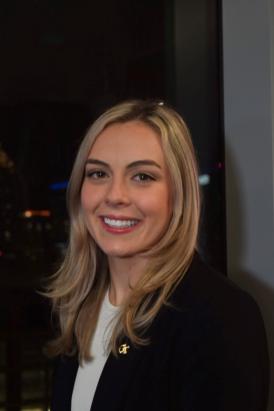
Danielle Glickstein
Danielle Glickstein
Bachelor of Science in Biomedical Engineering
Finance Certificate, Scheller College of Business
What is often true is that some students take a much different career path than what their major is geared toward. This is true for Danielle Glickstein, who is working in healthcare investment banking after graduating in May with a bachelor’s degree in biomedical engineering and a finance certificate from the Scheller College of Business.
“A lot of people are going to go the R&D route, which can be super exciting, challenging, and fulfilling,” she said. “But if that path doesn't fit your strengths or career goals, that absolutely does not mean BME is not for you. BMEs have so many skills that can be great for so many different jobs--quality engineering, clinical engineering, medical device sales, healthcare banking/venture capital/private equity, product management, etc.”
The beauty of Coulter BME, Glickstein said, is that the program is intentional in allowing students of all backgrounds to thrive whether they want to be innovative and entrepreneurial, save the world, or find their own space in the healthcare and engineering fields.
She found that through Capstone, she learned the value of teamwork to bring out the best of everyone’s skillset.
“From the very beginning of the semester, we carved out 5 minutes at the end of every meeting as a "wellness check" to discuss our personal lives in whatever detail we felt comfortable--it allowed us to connect personally, not get distracted during the rest of our meeting, and allocate work fairly and intentionally depending on who had a hell week vs. who was more free that particular week,” Glickstein said. “This protected all of our mental health and kept every team member engaged in our team and project.”
As she embarks on her new venture in New York City as a Healthcare Investment Banking Analyst, Glickstein, who is Coulter BME’s Outstanding Community Service Award recipient, encourages students to find the things on campus that connect with them the most.
“There are opportunities at Tech to learn more about these things--you just need to seek them out for yourself,” she said.
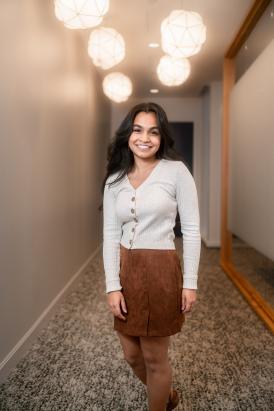
Harini Mohan
Harini Mohan
Bachelor's Degree in Biomedical Engineering
Minor in Industrial Design
When Harini Mohan reflects back on her year’s at Georgia Tech in the biomedical engineering department, she appreciates she had the ability to customize his degree path with courses , research, and electives that were challenging and catered to her interests.
“I think Tech makes it really easy to have a fulfilling experience within BME,” she said.
In her time at Tech, Mohan took CODE, a class where he shadowed doctors at Grady and Emory hospitals to observe how an emergency room functions. She also participated in Capstone, where he not only gained new friends, but also got to view a shoulder surgery, learn how to metal print, and lead interviews with healthcare professionals. For all of these experiences, Mohan was awarded Outstanding Industrial Experience in Coulter BME for demonstrating her commitment to the biomedical engineering field.
Post-graduation will be quite busy for Mohan as she will head to California to work at Genentech before returning to Georgia Tech for another year to complete her master's in biomedical innovation and development. Also, she and two of her close college friends are traveling to Europe this summer.
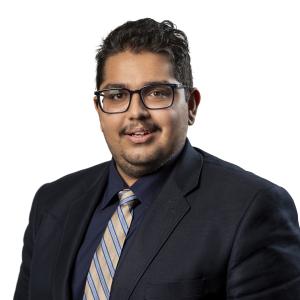
Gururaj Deshpande
Gururaj Deshpande
Bachelor of Science in Biomedical Engineering
Minor in Computer Science (Intelligence)
For Gururaj Deshpande, one of his most memorable experiences as a biomedical engineering student is taking Intro to Biomedical Engineering Design with lecturer Martin Jacobson.
“Marty is a BME legend,” Deshpande said.
Connecting with faculty like Jacobson, be it during classroom lecturers and projects, or getting permission to grab food from the learning commons, made Deshpande’s college experience that much more enjoyable.
Deshpande, who earned the Outstanding Academic Service Award, advises students not to set a fixed plan on what they want to do after graduation.
“In your first two years, join some clubs and research groups and try to figure out what you really like,” he said. “Then spend your next two years doing what you like doing. Also, make sure you enjoy doing what you are doing. If you aren't having fun doing it, then it's not worth doing.”
Deshpande plans to take a second trip around the Georgia Tech campus as he embarks on a masters in computer science this fall.
“Glad to be back!”
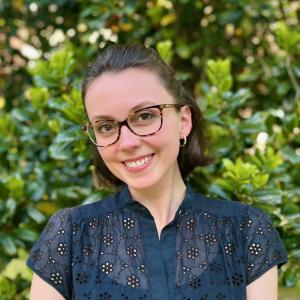
Abigail Paulson
Abigail Paulson
Ph.D. in Biomedical Engineering
For many students, one of the advantages of attending Georgia Tech is the opportunity to engage in research with highly recognized faculty within the field. This was the case for Abigail Paulson, Coulter BME’s Outstanding Fundamental/Basic Research Award winner who earns her Ph.D. this spring.
A highlight of Paulson’s time at Georgia Tech has been the work she accomplished with her advisor, Dr. Annabelle Singer.
“I was one of her first graduate students and so my journey through graduate school has been alongside my advisor’s journey forward in her career, from new assistant professor, to having an established lab and recently receiving tenure,” she said. “I think this was a really unique experience—it gave me a lot of appreciation for what it takes to establish a research program, and I’m excited to see how the lab continues to grow!”
Graduate school also afforded Paulson to compete in the 3MT competition, which challenges students in three minutes to effectively explain their research to a lay audience.
“I would recommend this to all graduate students! I had a great time hear about the research going on in graduate programs across the Institute, and preparing my talk helped me feel confident to share my work with diverse audiences,” she said.
Paulson will spend the next few months wrapping up her research projects before pursing her career in the biomedical engineering industry.
She encourages students to keep pursuing their goals.
“Stay motivated and positive by remembering your goals but taking each day as it comes.”
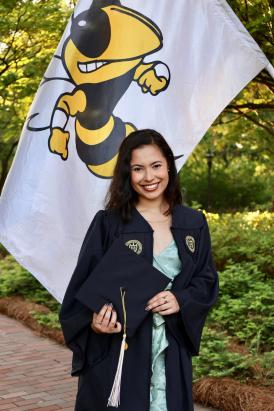
Nicole Diaz
Nicole Diaz
Bachelor of Science in Biomedical Engineering
Minor in Health and Medical Sciences
Connection and collaboration not only help students better understand other disciplines as they relate to their own, but also build the leadership skills necessary to manage people from various backgrounds.
For Nicole Diaz, she had the opportunity to lead as the founder and manager of the Sanger Sequencing Initiative in Georgia Tech’s Molecular Evolution Core. She had a chance to work alongside a team of students from computer science, chemical and biomolecular engineering, biology, industrial design, and other biomedical engineering students to develop an innovative and sustainable solution for research labs conducting DNA testing.
“I experienced the power of numbers, knowledge, and purpose first-hand as a leader within this project,” she said. “The realization of what a program like this could represent for students that come after me has been a humbling and exciting feat.”
After graduation, Diaz plans to continue her work as the Sanger Sequencing service lead until fall 2023 when she will start working full-time for Accenture as a Business and Integration Architecture Analyst.
She encourages current students to take a deep-dive and develop knowledge in one or two areas of interest, be it a student organization, research project, job, or volunteer opportunity.
“There is power in consistency, community, and finding your balance between school, work, and extracurriculars.”
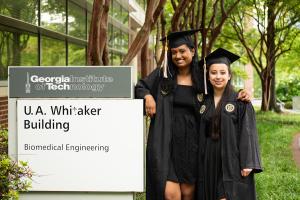
Alyssa Paul
Alyssa Paul
Bachelor of Science in Biomedical Engineering
Minor in Industrial Design
One thing Alyssa Paul can say that helped her journey through Georgia Tech and the biomedical engineering program is friendships. Her best friend and fellow BME student, Neha Rajan, was the first person she ever met. Now this May, Paul and Neha can step across the stage to accept their undergraduate degrees together.
“We met at an incoming student meet-and-greet back in Illinois and became friends at Tech when we recognized each other at FASET and realized we were in the same LLC, Grand Challenges,” she said. “Feeling super excited (and a little bit bittersweet) to be graduating together.”
One of Paul’s most memorable moments was presenting my capstone project at this spring’s Capstone Expo. And she plans to start a new job in medical device manufacturing with Boston Scientific after graduation.
“Be sure to connect with your classmates and teammates!”
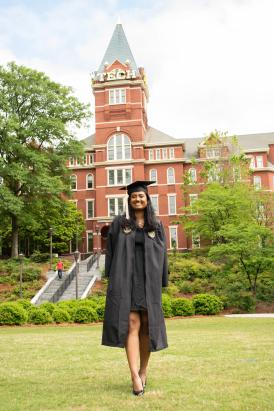
Neha Rajan
Neha Rajan
Biomedical Engineering
Minor in Computing and Devices
When Neha Rajan attends spring commencement, she will complete her bachelor’s degree and do it with one of her closest friends, Alyssa Paul, who she met at Georgia Tech’s FASET program after first running into each other at a meet-and-greet event in Illinois.
When she looks back on her time at Georgia Tech in the Coulter BME program, one of her fondest memories was Capstone Expo. Her group’s project, an automatic urine output measurement system which integrates with a toilet, elicited a strong response from those who attended the expo who shared their own patient experiences in the hospital.
“People talked about their experiences and their loved ones experiences, and they said something like our device would have made their life a lot easier,” she said. “Being able to create something that can have a large impact for our Capstone project was really cool.”
Rajan encourages students to get involved with different extracurricular actives, research, and internships to developed well-rounded skillset and to find what interests them most.
Rajan plans to attend graduate school at Johns Hopkins University after graduation.
“Branch out and get involved, work on your passion projects and take advantage of all of the resources you have,” she said. “Enjoy your classes and talk to your professors often, as they want to share everything they know. Have fun and be willing to learn.”
Latest BME News
Commercialization program in Coulter BME announces project teams who will receive support to get their research to market.
Courses in the Wallace H. Coulter Department of Biomedical Engineering are being reformatted to incorporate AI and machine learning so students are prepared for a data-driven biotech sector.
Influenced by her mother's journey in engineering, Sriya Surapaneni hopes to inspire other young women in the field.
Coulter BME Professor Earns Tenure, Eyes Future of Innovation in Health and Medicine
The grant will fund the development of cutting-edge technology that could detect colorectal cancer through a simple breath test
The surgical support device landed Coulter BME its 4th consecutive win for the College of Engineering competition.
New research from Georgia Tech helps doctors predict how therapies will interact with a child's immune system, potentially improving outcomes and reducing risks.

